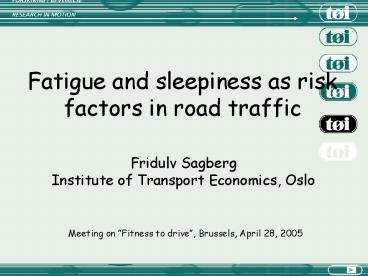Fatigue and sleepiness as risk factors in road traffic
1 / 13
Title: Fatigue and sleepiness as risk factors in road traffic
1
Fatigue and sleepiness as risk factors in road
traffic
- Fridulv SagbergInstitute of Transport Economics,
Oslo
Meeting on Fitness to drive, Brussels, April
28, 2005
2
IMMORTAL workshop on driver fatigue Main topics
- The scope of the problem
- Daytime sleepiness general and clinical aspects
- Precursors and indicators
- Driver warning systems
- Managing occupational driver fatigue
3
IMMORTAL Deliverable P4.2
- Edited by Fridulv Sagberg, TØI
- Contributors
- Paul Jackson Awake Ltd, London
- Hans-Peter Krüger Universität Würzburg
- Alain Muzet CNRS-CEPA, Strasbourg
- Adrian Williams St. Thomas Hospital, London
4
Driver fatigue A serious problem
- Incidence of falling asleep while driving gt 10
per year - About 4-5 of falling-asleep incidents result in
crashes (including personal injury or property
damage) - In addition An unknown number of crashes where
the driver is fatigued but not actually falling
asleep - Young males are over-represented
- Long-distance truck drivers are at high risk
5
Consequences of falling asleep at the
wheel(Norwegian study, n1061)
6
Crashes related to driver fatigue
- Between 5 and 15 of all personal injury crashes
are related to fatigue (estimates vary
considerably) - High average severity
- Rural roads, low traffic and/or night-time
- Most fatigue-related crashes occur during daytime
- Higher risk during the night, but less traffic
- Night-time crashes are more severe
7
Daytime sleepiness Main influences
- Amount of sleep
- cumulative effect of less-than-normal sleep for
several consecutive nights - Time since sleep
- Circadian rhythm
- Sleep-related problems/disorders
8
Sleep-related disorders
- Obstructive sleep apnoea/hypopnoea syndrome
(OSAHS) - High prevalence among middle-aged men (4-5 )
- Narcolepsy
- Prevalence 1 in 2000
- Effective treatment available
- Normal sleep problems
- Difficult to fall asleep
- Waking up to early
- Drivers who report sleep problems are
overrepresented in crashes
9
Drivers with sleep problems are over-represented
in crashes
- Relative risk estimates from IMMORTAL
case-control study - Frequent sleep-onset insomnia 1.87
- Frequent tiredness 1.36(frequent once per
week or more)
10
What sleepy drivers do
- Most drivers feel various symptoms of tiredness
before falling asleep at the wheel - Symptoms may possibly be misinterpreted or
ignored - Many drivers erroneously think they can stay
awake by effort - They often try inefficient countermeasures
- opening window, playing music, etc.
- Therefore Countermeasures relying only on driver
actions will have limited effect
11
Driver warning systems
- Based on recording driver behaviour
- physiological indicators, eyelid closure, driving
performance - Warn driver when early signs of sleepiness are
detected - Interfere with driving (take over control to stop
the car) when serious sleepiness is detected - Ongoing research in other EU projects, e.g. AWAKE
(see www.awake-eu.org)
12
Fatigue management in occupational settings
- Educational programmes for companies
- Include fatigue management in company policy
- Work organisation
- Adequate shiftwork schedules
- Trip planning
13
Policy implications
- Base countermeasures on the fact that many
drivers are not motivated to stop driving when
fatigued - Warn drivers
- Further research on in-car systems
- Increased use of profiled edgelines and
centrelines(rumble strips) - Implement fatigue management in Occupational
Health and Safety legislation - Stimulate research on optimal rest-work
schedules, as a basis for improved
Hours-of-Service Regulations - Inform the general public about sleep disorders
and other risk factors - Prevent serious consequences
- Forgiving road system
- Car occupant protection systems

